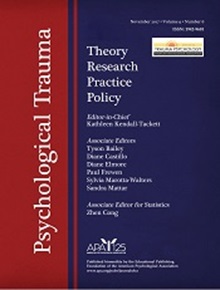The role of maternal postmigration living difficulties in intergenerational trauma transmission among asylum-seeker mother-child dyads: Exploring complex posttraumatic stress disorder as a mechanism.
IF 2.7
2区 心理学
Q2 PSYCHIATRY
Psychological trauma : theory, research, practice and policy
Pub Date : 2024-09-09
DOI:10.1037/tra0001767
引用次数: 0
Abstract
OBJECTIVE Among forcibly displaced people, maternal trauma and stress have been implicated in poor child socioemotional outcomes via intergenerational trauma transmission. This study explored the role of maternal postmigration living difficulties (PMLD) in the pathway linking maternal trauma, trauma-related psychopathology, and child socioemotional outcomes among mother-child dyads seeking asylum in a high-risk urban setting. METHOD Participants were East African (Eritrean) mothers (N = 127) of preschool-aged children seeking asylum in Israel. Using moderated mediation analysis, we tested whether and how PMLD may moderate the mediating role of current maternal International Classification of Diseases, 11th revision (ICD-11) posttraumatic stress disorder (PTSD) and complex posttraumatic stress disorder disturbances in self-organization (DSO) symptoms between past maternal trauma exposure and current postdisplacement child internalizing and externalizing difficulties. Children's direct exposure to adverse life experiences was controlled for. RESULTS Maternal PTSD symptoms mediated the association between past maternal trauma exposure and child internalizing difficulties, but not externalizing difficulties, across all levels of current maternal PMLD. However, maternal DSO symptoms mediated internalizing and externalizing child outcomes, but only among mothers reporting high levels of current PMLD. CONCLUSION This study provides novel evidence that PMLD may amplify the toxicity of past maternal trauma exposure for poor child socioemotional outcomes via ICD-11 DSO symptoms. The intergenerational transmission pathway via the narrower fear-based ICD-11 PTSD, however, is independent of the degree of maternal PMLD. Findings suggest that policies designed to buffer intergenerational trauma transmission among forcibly displaced people may need to consider the toxicity of PMLD as well as enable mothers to heal from PTSD. (PsycInfo Database Record (c) 2024 APA, all rights reserved).母亲移民后的生活困难在寻求庇护者母子二人间的代际创伤传播中的作用:探索作为一种机制的复杂创伤后应激障碍。
目的在被迫流离失所的人群中,母亲的创伤和压力通过创伤的代际传递被认为与不良的儿童社会情感结果有关。本研究探讨了在高风险城市环境中寻求庇护的母子二人组中,母亲移民后生活困难(PMLD)在连接母亲创伤、创伤相关心理病理学和儿童社会情感结果的途径中的作用。通过调节中介分析法,我们检验了 PMLD 是否以及如何调节当前母亲的国际疾病分类第 11 版(ICD-11)创伤后应激障碍(PTSD)和复杂创伤后应激障碍自我组织障碍(DSO)症状在过去的母亲创伤暴露与当前流离失所后儿童的内化和外化困难之间的中介作用。结果母亲创伤后应激障碍症状在过去的母亲创伤暴露与儿童内化困难之间起中介作用,但在目前母亲PMLD的所有水平上,母亲创伤后应激障碍症状在儿童外化困难之间不起中介作用。结论 本研究提供了新的证据,证明 PMLD 可能会通过 ICD-11 DSO 症状放大过去母亲创伤暴露对不良儿童社会情感结果的毒性。然而,通过较窄的基于恐惧的 ICD-11 PTSD 的代际传播途径与母亲的 PMLD 程度无关。研究结果表明,旨在缓冲被迫流离失所者创伤代际传递的政策可能需要考虑 PMLD 的毒性,并使母亲能够从创伤后应激障碍中痊愈。(PsycInfo Database Record (c) 2024 APA,保留所有权利)。
本文章由计算机程序翻译,如有差异,请以英文原文为准。
求助全文
约1分钟内获得全文
求助全文
来源期刊
CiteScore
11.20
自引率
3.20%
发文量
427
期刊介绍:
Psychological Trauma: Theory, Research, Practice, and Policy publishes empirical research on the psychological effects of trauma. The journal is intended to be a forum for an interdisciplinary discussion on trauma, blending science, theory, practice, and policy.
The journal publishes empirical research on a wide range of trauma-related topics, including:
-Psychological treatments and effects
-Promotion of education about effects of and treatment for trauma
-Assessment and diagnosis of trauma
-Pathophysiology of trauma reactions
-Health services (delivery of services to trauma populations)
-Epidemiological studies and risk factor studies
-Neuroimaging studies
-Trauma and cultural competence

 求助内容:
求助内容: 应助结果提醒方式:
应助结果提醒方式:


